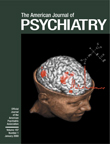Clinical Trials and Effectiveness Research
To the Editor: Kenneth B. Wells, M.D., M.P.H, has made an important contribution with his article (1). It may be helpful to keep the following considerations in mind in interpreting both efficacy and effectiveness studies for both clinical and policy decision making.
Outcomes are most often defined in terms of easy-to-measure markers. Features such as autonomy or authenticity are rarely considered and are also never measured in either type of study. Yet they are most relevant in terms of the utility of given outcomes to individuals, as well as our culture and our society (2–4). More easily measurable outcomes continue to dominate the studies reported even in this Journal. Should all outcome studies carry at least an explanation of why the particular outcomes were chosen and why meaningful outcomes were not considered?
1. Wells KB: Treatment research at the crossroads: the scientific interface of clinical trials and effectiveness research. Am J Psychiatry 1999; 156:5–10Link, Google Scholar
2. Bursztajn HJ: Efficacy research and psychodynamic psychiatry (letter). Am J Psychiatry 1991; 148:817–818Link, Google Scholar
3. Bursztajn HJ, Hamm RM: The clinical utility of utility assessment. Med Decis Making 1982; 2:162–165Crossref, Google Scholar
4. Bursztajn HJ, Feinbloom RI, Hamm RM, Brodsky A: Medical Choices, Medical Chances: How Patients, Families, and Physicians Can Cope With Uncertainty. New York, Routledge, Chapman & Hall, 1990Google Scholar



